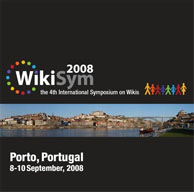What's a wiki?

What is a wiki?
The canonical characteristics seem to be open, organic, and participatory. Some have suggested that wikis should also be observable, that readers can track their evolution over time.
This is a problem for me. I'm interested in nobitic tools — computing tools we use when we're writing to ourselves, to you and me and perhaps everyone we know. Sometimes these tools aren't completely open: no, sorry but I'd rather you didn't write in my notebook! Nobitic tools aren't always completely participatory: when we plan the WikiSym conference, there might be surprises that we planners don't want to discuss in front of everyone, because we want them to be surprises. And I think there's clearly a lot of WikiNature in Tinderbox and VoodooPad and TiddlyWiki, even though they're personal wikis.
Besides, my first encounter with WikiSym was a keynote about nobitic wikis. I don't do Open software. One of the key themes of NeoVictorian Computing is distrust of collaboration; "participatory" sounds nice but great software comes from the passion and insight of one or two creators, not from alliances and committees. (And still, somehow I'm the next program chair. Hmmmm)
Organic is good: wikis have complex and changing structure, structure that grows out of the writing instead of being imposed in advance. Everything is intertwingled. (I'm an organic chemist by training and so I cavil at the use of the word, which tends to validate mystical notions of souls and life force and such stuff. But it'll do for now.)
But lots of hypertexts are organic in this sense, but don't feel like wikis. afternoon is certainly organic, the link structure is brilliant and flows naturally from the story, but is afternoon a wiki? And Wikipedia adopts a rigid, predefined structure (and employs an entire legion of troops to weed out categories and expunge links), yet we don't really want to expel Wikipedia from the wiki club.
I propose that a fourth distinctive feature of wikis is that they are nominative: to link to something, you have only to name it. And, if you name something, you link to it. (Yes, you may have exceptions, but these are the norms, the things the system implicitly wants and expects.) Nominative links have very interesting implications for the structure of wikis and for their idiomatic patterns; for example, it's tricky to write a good feint structure with nominative links. (I'm not wild about the term "nominative", either: this seems to be my day for nomenclature tangles. Ideas? Email me. )